
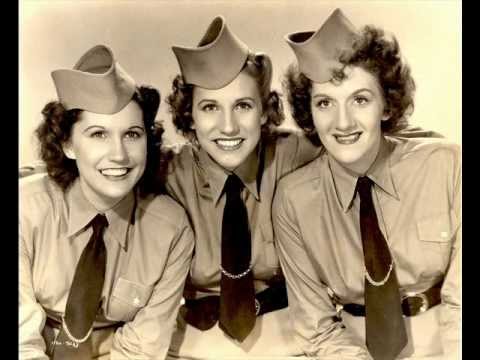 In the 1940s, swing and boogie-woogie music became a family affair, courtesy of three young women from Minnesota. The trio of singing sisters LaVerne, Maxene, and Patty Andrews, had vocal chemistry that produced smooth harmony and charismatic stage presence. The Andrews Sisters became a mainstay on the radio, stage, in film, and were a symbol of support for the US military.
In the 1940s, swing and boogie-woogie music became a family affair, courtesy of three young women from Minnesota. The trio of singing sisters LaVerne, Maxene, and Patty Andrews, had vocal chemistry that produced smooth harmony and charismatic stage presence. The Andrews Sisters became a mainstay on the radio, stage, in film, and were a symbol of support for the US military.
Hailing from the Minneapolis area, LaVerne was born in 1911, Maxene in 1916, and Patty in 1918. The girls began their singing career when Patty was just 7 years old and already the group’s lead singer. A few years later, LaVerne worked at the Orpheum Theatre in Minneapolis, playing piano for the silent film showings in exchange for dance lessons for the three sisters. There, the girls won first prize in a talent contest, so when their father’s restaurant failed, the sisters began performing on the road to help support the family.
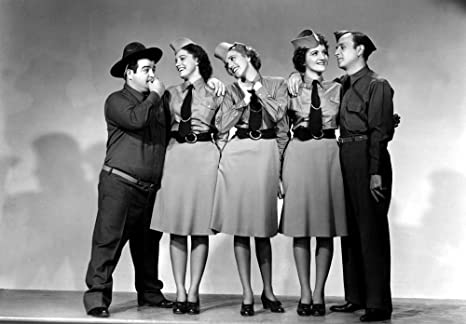 Early on they toured in vaudeville with Leon Belasco and his orchestra. They achieved attention at the national level in 1937 when their song “To Me, You Are Beautiful” was released by Decca Records. The song showed off their talent for harmonizing and led to a string of hits.
Early on they toured in vaudeville with Leon Belasco and his orchestra. They achieved attention at the national level in 1937 when their song “To Me, You Are Beautiful” was released by Decca Records. The song showed off their talent for harmonizing and led to a string of hits.
The US entered World War II when the Andrews Sisters were at the height of their popularity, which fostered a strong association between their music and that period. They released their most popular songs at this point, many of which had military-related themes or inspiration, including “Boogie Woogie Bugle Boy,” “Rum and Coca Cola,” “Three Little Sisters,” “A Hot Time in the Town of Berlin,” and “Don’t Sit Under the Apple Tree (with Anyone Else But Me).”
Their reach extended when they performed songs with Bing Crosby and appeared in movies set in the military, such as Buck Privates and Private Buckaroo. The sisters starred in Give Out, Sisters which saw them disguised as old women, as well as What’s Cookin’? and Moonlight Cactus. They sang the title song for Hollywood Canteen, sang “You Don’t Have to Know the Language” with Crosby for Road to Rio, and sang “Sleepy Serenade” for Abbott & Costello’s Hold that Ghost.
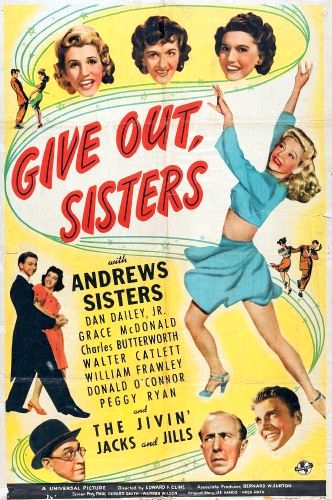 Showing support for the military, they also performed for the troops, traveling throughout the US, Africa, and Italy. They visited each branch of the military at their bases, in war zones, hospitals, and munitions factories. For non-military audiences, the Andrews Sisters encouraged them to buy war bonds and they joined Bette Davis and John Garfield to found California’s Hollywood Canteen where they performed for servicemen.
Showing support for the military, they also performed for the troops, traveling throughout the US, Africa, and Italy. They visited each branch of the military at their bases, in war zones, hospitals, and munitions factories. For non-military audiences, the Andrews Sisters encouraged them to buy war bonds and they joined Bette Davis and John Garfield to found California’s Hollywood Canteen where they performed for servicemen.
The Andrews Sisters recorded Victory Discs for the Allied troops and while touring, the ladies would invite three random servicemen out for dinner. They performed on radio programs like G.I. Journal, Mail Call, and Command Performances, earning the nickname “the Sweethearts of the Armed Forces Radio Service.”
The band went on hiatus in the 1950s. Tensions developed when Patty married the group’s pianist Walter Weschler, who became their manager and demanded that Patty be paid more. Patty decided to become a solo act, but what caused even more animosity was that Maxene and LaVerne learned about her decision by reading about it in the news. Further extending the divide, Patty sued LaVerne for a larger share of their parents’ estate, who had died in the late ‘40s. The Andrews Sisters trio broke up in ’53.
LaVerne and Maxene began touring as a duo, receiving good reviews for a tour in Australia. The duo performed on The Red Skelton Show in October ’54, taking shots at their sister by singing the song “Why Do They Give the Solos to Patty” and lip synching “Beer Barrel Polka with Skelton dressed as Patty. Unamused by the performance, Patty sent a cease and desist order to the show.
The sisters reconciled in 1956, reforming the group under Capital Records. By this point rock ‘n roll was becoming the popular style, so they incorporated the shift into their music, but didn’t see much success. The band also rerecorded some of their earlier hits and toured throughout the ‘60s at nightclubs.
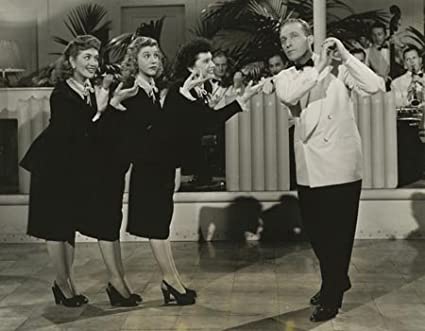 They performed as a trio for the last time in September ’66 on The Dean Martin Show. After a year-long fight with cancer LaVerne died a few months later in May ’67 at the age of 55. Maxene and Patty continued performing through ’68, then Maxene started teaching acting and drama at Lake Tahoe College while Patty returned to being a solo act.
They performed as a trio for the last time in September ’66 on The Dean Martin Show. After a year-long fight with cancer LaVerne died a few months later in May ’67 at the age of 55. Maxene and Patty continued performing through ’68, then Maxene started teaching acting and drama at Lake Tahoe College while Patty returned to being a solo act.
When Bette Midler covered “Boogie Woogie Bugle Boy” in ’73, the Andrews Sisters were back in the spotlight. A year later they starred in the Sherman Brothers’ World War II musical: Over Here! on Broadway. The Shermans wrote parts with Patty and Maxene in mind, joined by Janie Sell to complete a trio. That musical also starred newcomers like John Travolta, Marilu Henner, and Treat Williams. It ran for nearly a year, then ended amid some controversy with the producers claiming that the Andrews Sisters were demanding too much money and Maxene and Patty stating that the show was not being managed well. It was the Andrews Sisters last big tour and the last time the sisters would sing together professionally.
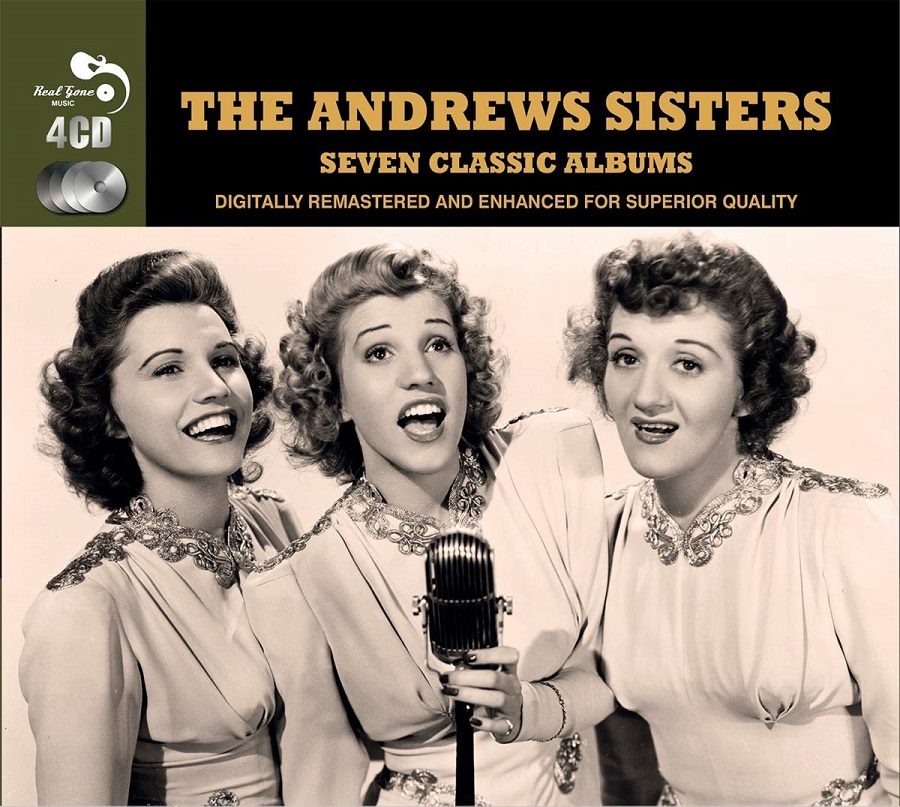 They went their separate ways again with Patty performing solo and regularly appearing on The Gong Show in the late ‘70s while Maxene became a cabaret singer and toured successfully for about 15 years. They reunited in ’87 when the group was honored with a star on the Hollywood Walk of Fame and even sang some of “Beer Barrel Polka.”
They went their separate ways again with Patty performing solo and regularly appearing on The Gong Show in the late ‘70s while Maxene became a cabaret singer and toured successfully for about 15 years. They reunited in ’87 when the group was honored with a star on the Hollywood Walk of Fame and even sang some of “Beer Barrel Polka.”
In October ’95 Maxene was performing in an Off-Broadway production when she had her second heart attack (the first was in ’82) and passed away at 79 years old. Before her death, Maxene had done an interview with music historian William Ruhlmann in which she expressed that her only regret was not being able to repair her relationship with her sister. Patty lived to be 94, dying of natural causes in January 2013.
The Andrews Sisters were highly influential on harmonizing groups – not just on ones that shared their boogie-woogie style, but also on doo-wop, pop, and R&B groups. Their influence can be heard in a variety of singers from Bette Midler to Christina Aguilera to Pentatonix. Throughout their career, the Andrews Sisters sold around 80 million records and in 1998 they were among the inaugural inductees to the Vocal Group Hall of Fame.
The Boogie Woogie Bugle Boy should be proud.











